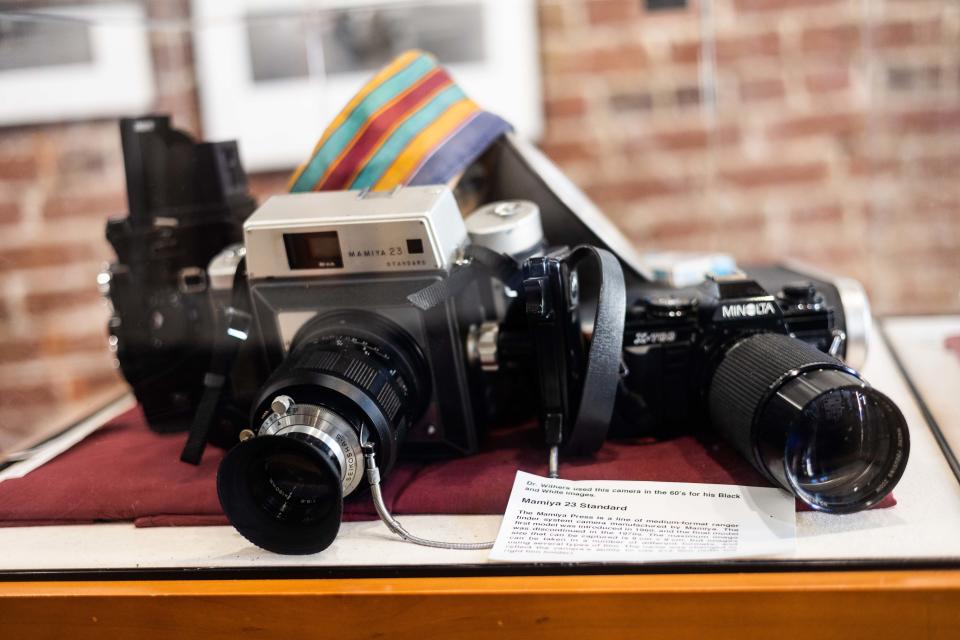Withers Collection Museum and Gallery on Beale Street named to National Civil Rights Trail
- Oops!Something went wrong.Please try again later.
- Oops!Something went wrong.Please try again later.
As a child, Rosalind Withers grew annoyed when her father, Ernest Withers, stopped constantly to take photos. The only time he didn’t have a camera around his neck, she remembered, was when there was a plate in front of him.
But as time passed, she came to realize what a gift his vast collection of pictures was to not just Memphis, but the entire nation. A prolific photographer whose career spanned more than 60 years, Ernest Withers compiled a portfolio of over 1.8 million photos. He took powerful shots of icons like Dr. Martin Luther King Jr., Jessie Jackson, Jackie Robinson, Aretha Franklin, Elvis Presley, B.B. King, and Tina Turner. He thoroughly documented the Civil Rights Movement, capturing crucial moments in time and preserving them for future generations.
And he was featured in publications like the New York Times, The Washington Post, Ebony, Newsweek, Life, People, and Time.
Withers passed away in 2007, but his efforts to capture history haven’t been forgotten. In 2011, the Withers Collection Museum and Gallery was established at 333 Beale St., the site of his last working studio. And on Tuesday, his legacy received a major boost, when the location was named a new site on the National Civil Rights Trail ― making it the 15th National Civil Rights Landmark in Tennessee.

'Truly a special moment'
Gov. Bill Lee, Memphis Mayor Paul Young, Rosalind Withers, Tennessee Department of Tourist Development Commissioner Mark Ezell, and Memphis Tourism CEO Kevin Kane all spoke at the announcement.
“This is… truly a special moment for us,” said Rosalind Withers. “It is with great honor, great humility, and great love to know that this history will be preserved and that people from all walks of life will be invited to come through these doors.”
Young and Lee both mentioned Withers’ vigorous documentation of the Civil Rights Movement, crediting him for providing photos that tell the story of one of the most significant periods in American history.

“There’s no other city in the country that can tell the story of civil rights better than Memphis,” Young said. “Part of the reason we can tell that story so well is because it was well documented. And it was well-documented by Ernest Withers.”
'We have 1.8 million stories to tell'
Many of Withers’ photos, however, aren’t available to the public. Of the more than 1.8 million photos he took, less than 1% ― roughly 17,000 ― have been digitized. But with the museum and gallery gaining a spot on the National Civil Rights Trail, more of his work is poised to be made available.
“This Withers collection, we only see a sliver of it,” Lee said, at the event. “There is work being done now to expand the ability of the public to see more and more of this work, and it needs to be seen. I think the recognition of this spot and that it’s now on the trail will allow this documentation to become a part of people’s lives.”
Already, Withers’ photos that haven’t been on display are starting to put faces with names.

A few years ago, Rosalind Withers explained during the event, Major League Baseball decided to incorporate Negro League players into its historical rankings. Extensive photos of Negro League players initially weren’t easy to come by. Ernest Withers, however, had taken plenty of them.
And now, those photos are being digitized, through a partnership with MLB.
“There were no pictures, there were no faces. But guess what? We have those faces. So Major League (Baseball) has partnered with us to digitize the baseball collection,” she said. “We've become, now, that trail of searching for history. And every time we digitize, every time we bring something out, you tell a new story. We have 1.8 million stories to tell.”
This article originally appeared on Memphis Commercial Appeal: Withers Collection Museum and Gallery named to National Civil Rights Trail

